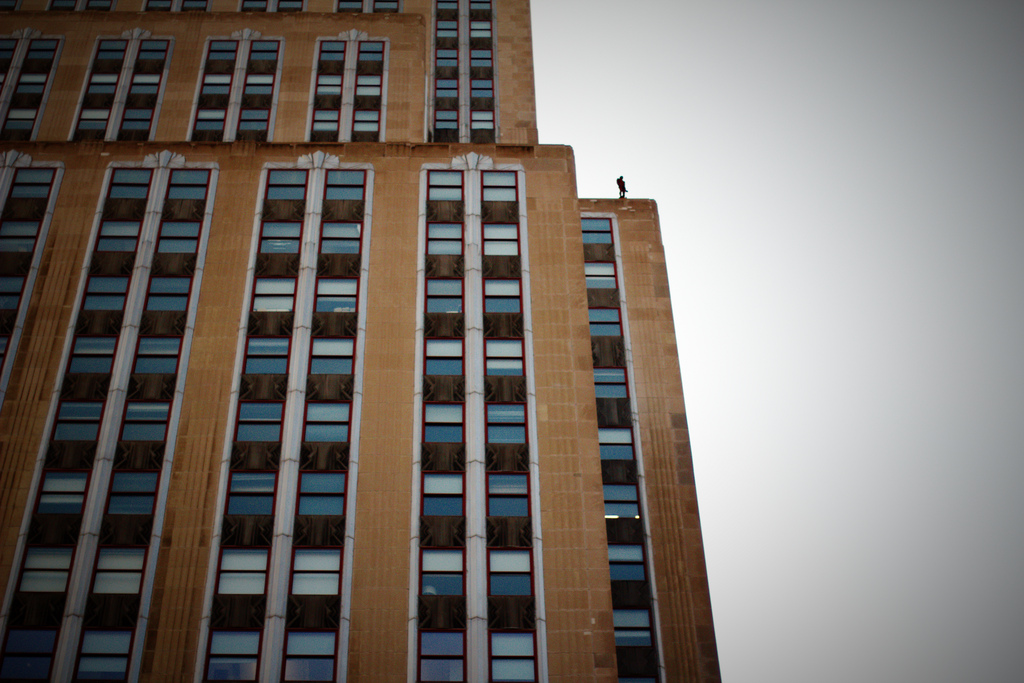Sure, it’s bad now. Nobody notices the jumpers anymore ’cause there’re too many of them. But back then it was actually bad. Dark times in Seattle. The bubble had burst, the dot-coms had crashed, and a lot of those high-lifers got dumped on their asses. Wasn’t the first time, of course. My old man had worked in lumber, in a paper plant. It happened to him, but that generation was tougher. That generation managed.
The next one didn’t.
The first jumper made a big of show of it. A self-proclaimed guru who thought he would change the world with his travel-and-expense software. He threw himself off the Space Needle on a partly cloudy day.
No note, no blog. Just a silent Wilbur-and-Orville into the wild blue yonder.
Turned out, he was just the start. For the next year, jumpers were a daily occurrence. There were hourly reports of some free-spending president, mover, maker, throwing him/herself off a building. Then there were dozens, a phenomenon, the falling men and women of Seattle. Execs, salarymen, even temps freeing themselves from their money, their jobs and lives, smiling, their ties and pencil skirts flailing in the wind.
By the time the news had gotten around to reporting the collateral damage—a pinch-faced Korean crushed here, a Hispanic woman hefting two paper shopping bags squashed there—people stopped paying attention. Jumpers became as casual as weather or traffic reports. There were lots – I can’t emphasize that enough. Lots. Mostly, I remember my first.
I was about a month into my first big boy job—marketing toothpaste. I fought hard for the position. Kept my head down, did my job, didn’t get fired. I was one of the lucky ones. I’d been waiting for the bus in downtown, Third and Seneca, thinking how do we make Bit-a-Fresh pop, how do we make toothpaste new? Was it the colors, the green, white, and red? Too old-fashioned. Was the red too much like blood? Definitely, I told myself.
My stop was at an intersection of tall, indiscriminate buildings and usually populated by a bustle of well-attired people in a hurry to wait. But that day the streets were vacant, downtown all but deserted. It was just me and a not-so-young-anymore man in an orange polo shirt and blue slacks pressing a bulky cellphone to his ear. He had sandy hair and a babyface. He looked straight ahead without blinking and spoke quietly in an endless rhythm. Yes. Mmm-hmm. Yes. I see.
When his call was finished, he stood up from the bench and threw his phone hard at the side of the passing Express.
“That’s it,” he shouted. “It’s finished. It’s all over.”
In a quick, jerky motion, he got within an inch of my face.
“She’s left me. She’s fucking left me.”
I looked down the street, hoping to see the 120 approaching. No luck.
“Who’s going to love me now?” he demanded. “Who?”
I straightened my tie, checked my shoulders for dandruff and thought: It’s best not to engage people. Not good to have a conversation without an end.
“Hey friend,” he said in a now-quiet tenor. “I asked you—yes, you—what happens next? Who do I go home to? Who do I tell about my day?”
I looked for the bus again.
He didn’t budge. At the time, we weren’t far off in age. I was older, or at least dressed like it. For a second, I thought it was the end. I thought he was going to go postal on me. Or worse.
So I told him, “Keep your head down. Sell people what they need.”
He was incredulous. “That’s all you’ve got for me?” he demanded, putting his hands on my shoulders.
Undeterred, I shrugged and smiled amiably. “That’s all I’ve got.”
He nodded and sighed. Taking in the air, taking in the clean, austere street, he said “alright then,” and made his way towards a Tully’s at the bottom of a gray high-rise.
A falling body sounds strange, like wind whistling between buildings, moving through their alleys. Only it’s coming from above, in the open air. You hear the clothing ripple, nearly come apart, as the body makes it way down.
______
Photo credit: Hello Turkey Toe / Foter / CC BY

